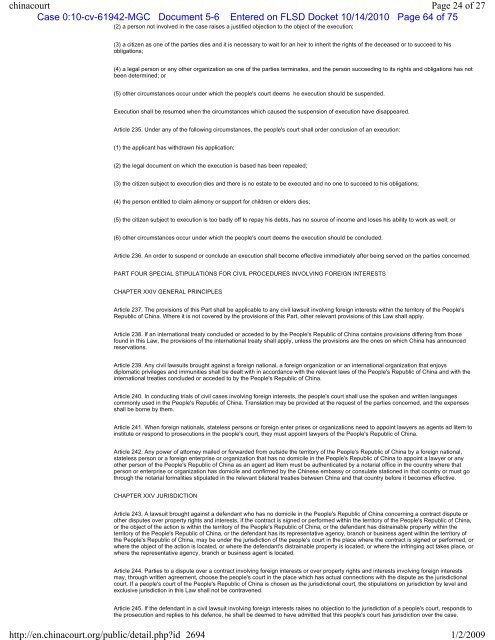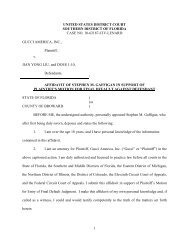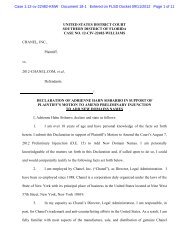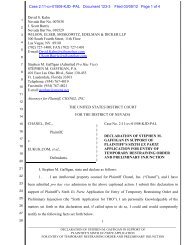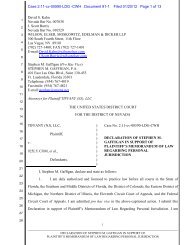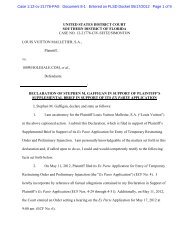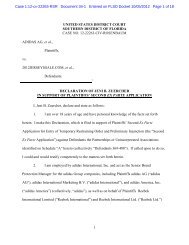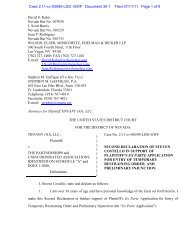UNITED STATES DISTRICT COURT SOUTHERN DISTRICT OF ...
UNITED STATES DISTRICT COURT SOUTHERN DISTRICT OF ...
UNITED STATES DISTRICT COURT SOUTHERN DISTRICT OF ...
You also want an ePaper? Increase the reach of your titles
YUMPU automatically turns print PDFs into web optimized ePapers that Google loves.
Case 0:10-cv-61942-MGC Document 5-6 Entered on FLSD Docket 10/14/2010 Page 64 of 75<br />
(2) a person not involved in the case raises a justified objection to the object of the execution;<br />
(3) a citizen as one of the parties dies and it is necessary to wait for an heir to inherit the rights of the deceased or to succeed to his<br />
obligations;<br />
(4) a legal person or any other organization as one of the parties terminates, and the person succeeding to its rights and obligations has not<br />
been determined; or<br />
(5) other circumstances occur under which the people's court deems he execution should be suspended.<br />
Execution shall be resumed when the circumstances which caused the suspension of execution have disappeared.<br />
Article 235. Under any of the following circumstances, the people's court shall order conclusion of an execution:<br />
(1) the applicant has withdrawn his application;<br />
(2) the legal document on which the execution is based has been repealed;<br />
(3) the citizen subject to execution dies and there is no estate to be executed and no one to succeed to his obligations;<br />
(4) the person entitled to claim alimony or support for children or elders dies;<br />
(5) the citizen subject to execution is too badly off to repay his debts, has no source of income and loses his ability to work as well; or<br />
(6) other circumstances occur under which the people's court deems the execution should be concluded.<br />
Article 236. An order to suspend or conclude an execution shall become effective immediately after being served on the parties concerned.<br />
PART FOUR SPECIAL STIPULATIONS FOR CIVIL PROCEDURES INVOLVING FOREIGN INTERESTS<br />
CHAPTER XXIV GENERAL PRINCIPLES<br />
Article 237. The provisions of this Part shall be applicable to any civil lawsuit involving foreign interests within the territory of the People's<br />
Republic of China. Where it is not covered by the provisions of this Part, other relevant provisions of this Law shall apply.<br />
Article 238. If an international treaty concluded or acceded to by the People's Republic of China contains provisions differing from those<br />
found in this Law, the provisions of the international treaty shall apply, unless the provisions are the ones on which China has announced<br />
reservations.<br />
Article 239. Any civil lawsuits brought against a foreign national, a foreign organization or an international organization that enjoys<br />
diplomatic privileges and immunities shall be dealt with in accordance with the relevant laws of the People's Republic of China and with the<br />
international treaties concluded or acceded to by the People's Republic of China.<br />
Article 240. In conducting trials of civil cases involving foreign interests, the people's court shall use the spoken and written languages<br />
commonly used in the People's Republic of China. Translation may be provided at the request of the parties concerned, and the expenses<br />
shall be borne by them.<br />
Article 241. When foreign nationals, stateless persons or foreign enter prises or organizations need to appoint lawyers as agents ad litem to<br />
institute or respond to prosecutions in the people's court, they must appoint lawyers of the People's Republic of China.<br />
Article 242. Any power of attorney mailed or forwarded from outside the territory of the People's Republic of China by a foreign national,<br />
stateless person or a foreign enterprise or organization that has no domicile in the People's Republic of China to appoint a lawyer or any<br />
other person of the People's Republic of China as an agent ad litem must be authenticated by a notarial office in the country where that<br />
person or enterprise or organization has domicile and confirmed by the Chinese embassy or consulate stationed in that country or must go<br />
through the notarial formalities stipulated in the relevant bilateral treaties between China and that country before it becomes effective.<br />
CHAPTER XXV JURISDICTION<br />
<br />
Article 243. A lawsuit brought against a defendant who has no domicile in the People's Republic of China concerning a contract dispute or<br />
other disputes over property rights and interests, if the contract is signed or performed within the territory of the People's Republic of China,<br />
or the object of the action is within the territory of the People's Republic of China, or the defendant has distrainable property within the<br />
territory of the People's Republic of China, or the defendant has its representative agency, branch or business agent within the territory of<br />
the People's Republic of China, may be under the jurisdiction of the people's court in the place where the contract is signed or performed, or<br />
where the object of the action is located, or where the defendant's distrainable property is located, or where the infringing act takes place, or<br />
where the representative agency, branch or business agent is located.<br />
Article 244. Parties to a dispute over a contract involving foreign interests or over property rights and interests involving foreign interests<br />
may, through written agreement, choose the people's court in the place which has actual connections with the dispute as the jurisdictional<br />
court. If a people's court of the People's Republic of China is chosen as the jurisdictional court, the stipulations on jurisdiction by level and<br />
exclusive jurisdiction in this Law shall not be contravened.<br />
Article 245. If the defendant in a civil lawsuit involving foreign interests raises no objection to the jurisdiction of a people's court, responds to<br />
the prosecution and replies to his defence, he shall be deemed to have admitted that this people's court has jurisdiction over the case.


